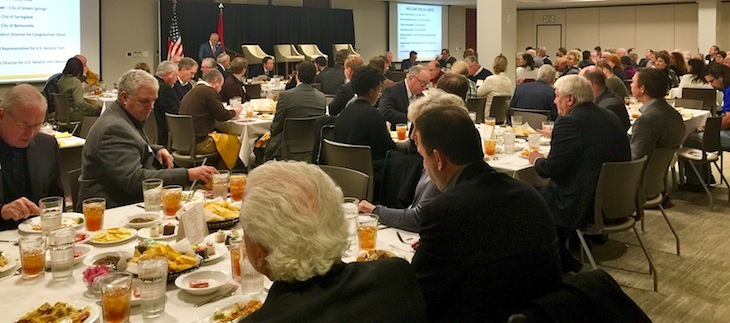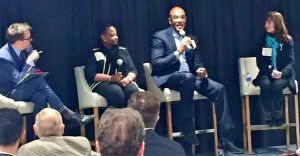Northwest Arkansas Council discusses diversity and inclusion agenda
by January 16, 2018 4:26 pm 1,807 views

Northwest Arkansas business and community leaders convened Tuesday (Jan. 17) in Springdale at the Northwest Arkansas Council’s winter meeting to hear about diversity and inclusion, issues that flagship companies in the region say is crucial to recruitment of top talent.
Ben Hasan, chief diversity and inclusion officer at Wal-Mart, issued a challenge to the business leaders in the room.
“This region is already diverse, we need to focus on inclusion and make Northwest Arkansas the inclusion capital of the world,” Hasan said.
Hasan was one of three panelists chosen by the Council to discuss diversity and inclusion. The regional think tank has chosen to take a deeper dive into theissue this year. Mary Oleksiuk, chief human resources officer at Tyson Foods, and Yvette Murphy-Erby, associate dean and professor of social work at the University of Arkansas, were the other two panelists questioned by moderator Kyle Kellams, news director at KUAF in Fayetteville.
Oleksuik said it’s easy for busy professionals to put their heads down and focus on the task at hand, but if the region is going to do a better job of inclusion it’s important to look up and take part in a bigger plan.
“Someone once told me diversity is inviting everyone to dinner, but inclusion is asking each one of them what they would like to eat,” she said.
She said Tyson Foods is working on inclusion and one of the greatest things she’s heard from families moving into the region is they tell her their children are not known as the odd ones, but are seen simply as the new kids in class.
“We have several C-level executives that have relocated their families to their region. Our chief technology officer moved from California, our CFO had a previous global assignment and our general counsel also relocated here and they know firsthand what it feels like to relocate and can identify with other new hires in the company on a personal level,” she said.
Erby said the UA takes a broad look at diversity and inclusion. She said diversity without inclusion is not effective because people need to have a sense of belonging that comes with inclusion. Hasan said Wal-Mart believes people who feel included are more productive. Oleksiuk said Tyson knows not everyone is good at everything and it takes all types to ensure company goals are met.
UNCOMFORTABLE CONVERSATIONS
The Council reports the region’s demographics continue to change with whites making up 73.3% of the total 525,032 people residing in the area last year. While whites are still a majority in the region, the influx of other ethnicities are growing, while the white population is shrinking. In the past seven years the white population is down from 76.27%, and the Hispanic/Latino population increased from 14.92% to 16.49% a gain of 17,510 people in the past seven years. Asians, African Americans Native Americans and Pacific Islanders each grew their share over the seven years.
By 2022, the Council estimates regional population will reach 581,621 with minority ethnicities each growing in size and the white population shrinking to 69.45%.
Hasan moved from Austin, Texas, to the region 10 years ago to work for Wal-Mart. He said the region’s ethnic makeup has changed dramatically in that time period. He applauded the Council’s efforts to focus on this issue because he said getting in front pf change creates an advantage for companies looking to recruit or relocate talent from around the world. But he warned having the discussions isn’t always pleasant and it is normal to feel uncomfortable because that’s how change occurs. He said Wal-Mart last year focused internally on unconscious bias, particularly in the those areas where managers are hiring or promoting individuals. He also said at Wal-Mart the white men are invited to participate in the diversity meetings and many of them have thanked him for the invite.

“We need everybody in the room if we are going to make progress on inclusion. Sometimes we might have 1,000 people in the room and the discussions can get heated, but you can be sure employees don’t check their feelings at the door when they come to work and it’s good to provide venues to discuss these tensions,” Hasan said of the talks held last year around shootings and police brutality in the U.S.
Oleksiuk said Tyson Foods takes a transparent look at each of its employees and asks them what they think is holding them back from promotion or achieving their best results. She advocates transparency with employees as a way to ensure everyone is heard.
GENERATION GAPS
Kellams asked the panelists how smaller agencies might also get involved in the mission. Erby said it’s often small agencies that have paved the way for the UA to conduct work in communities because smaller organizations can be more nimble and often have key relationships and can make introductions for the larger players.
Kellams asked each panelist how they might have been impacted by diversity or inclusion in their careers. Erby said the generation gap can also be a divisor in the workplace. A few years ago when the topic of online education came up in her social work department, the younger tech-savvy group wanted more online courses and the Boomers held back saying social work couldn’t effectively be taught online. She said the conversations were hard but in the end they did put together an online curriculum and was one of the first departments at the UA to do so.
Oleksiuk said she spent the early years in her career as a scientist in a mostly male-dominated workforce.
“I was the only female on my team and when I got pregnant with my first child, my co-workers sent me a condolence card. That’s when I realized the importance of inclusion,” she said.
Hasan said he spent the first 33 years of his career in computer science and being a black man, there wasn’t a lot of co-workers who looked like him three decades ago. He credited some guidance he received growing up in intercity Philadelphia to aim high and not let circumstances be an excuse. Hasan said he was a two-time college drop-out before finally finishing his computer science degree. He said Northwest Arkansas’ growing diversity is a benefit and planning for inclusion and the changing face of the region is a good thing.
“I spent 16 years in Dallas and 14 years in Austin and saw those region’s demographic changes take place and those cities didn’t plan for it. We can,” he said.
